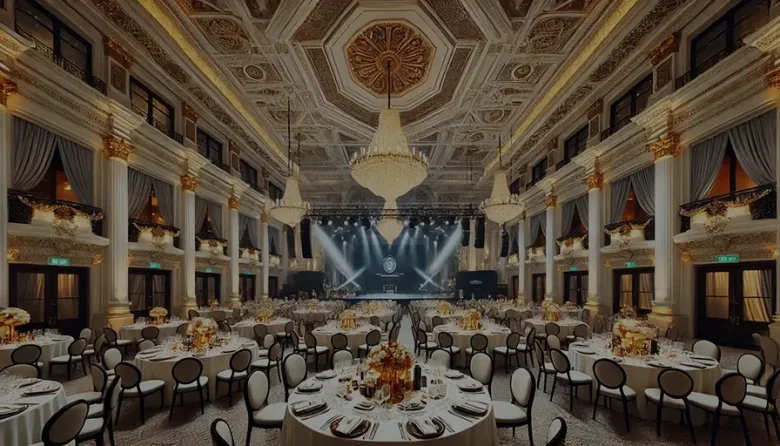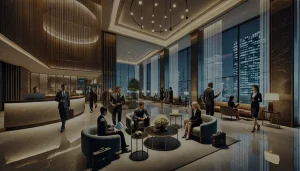Table of Contents
Historic luxury hotels have a unique aura, where each room exudes stories and memories that blend with the comfort of modern innovations. In places like the Ritz Paris, The Savoy in London and the iconic Copacabana Palace, it is possible to experience the meeting of tradition and technology, creating ideal settings for corporate events that want to make a statement and provide unforgettable experiences. This article delves into the details that make these hotels world references, exploring everything from their imposing architecture to the contemporary solutions that elevate the level of comfort and functionality.
The Charm of Luxury Historic Hotels
A Journey Through Time with Touches of Modernity
Historic luxury hotels are true guardians of culture and heritage, where every detail tells a part of a long story. Their imposing facades and carefully restored interiors allow visitors to be transported to a bygone era, while enjoying the most up-to-date amenities. The combination of past and present not only enhances the experience, but also reinforces the image of excellence and tradition, essential attributes for corporate events that want to inspire trust and credibility.
The Essence of Tradition and the Emotional Impact
The history present in every stone and ornament of these hotels exerts an unparalleled emotional power. Upon entering an environment where art, architecture and personal stories intertwine, participants in a corporate event are immediately enveloped by a unique atmosphere. This historical legacy creates an important difference, establishing a connection emotional that can transform a simple encounter into an experience striking and memorable.
The Duality Between Classical and Contemporary
Amidst the grandeur of their halls and corridors, historic hotels have adapted to modern times without losing their identity. The integration of cutting-edge technologies – such as advanced security systems, high-speed connectivity and automation solutions – allows these establishments to meet the demands of contemporary corporate events, ensuring functionality without sacrificing historic charm and elegance.
Real Examples of Excellence
Europe: Icons of Elegance and History
Hotel Ritz Paris
The Hotel Ritz Paris is a symbol of luxury and tradition, whose history dates back to the end of the 19th century. Renowned worldwide for its opulence, the Ritz not only preserves the memory of past times of glamour, but also embodies innovations that meet the most demanding standards of comfort. For corporate events, the hotel's classic atmosphere provides the perfect setting for high-level meetings, conferences and exclusive cocktail parties, where every detail is carefully thought out to impress guests.
The Savoy, London
Situated on the banks of the River Thames, The Savoy is another striking example of how tradition meets modernity. This hotel, which has hosted celebrities and historical figures, is constantly updated to offer spaces that combine classic elegance with modern technology. For corporate events, The Savoy stands out for the versatility of its spaces, which range from intimate meeting rooms to spacious conference areas, always maintaining the unmistakable touch of its history.
Hotel de Crillon
Located in one of the most iconic spots in Paris, the Hotel de Crillon is synonymous with refinement and cultural heritage. Its luxurious suites and ornate common areas tell stories of bygone eras, while its modernized infrastructure ensures the practicality needed to host sophisticated corporate events. The careful maintenance of its historic façade, combined with interior innovations, makes the Crillon a premium choice for companies seeking a distinctive and inspiring environment.
America: Tradition and Modernity in Harmony
Plaza Hotel, New York
The Plaza Hotel in New York is an icon that transcends generations. With an architecture that evokes old-school charm and updated facilities to ensure all contemporary comfort, the Plaza is a reference in hospitality. For corporate events, the hotel's atmosphere allows for business meetings with a touch of exclusivity, where history and luxury come together to create experiences incomparable. The privileged location and the adaptability of its spaces make it a strategic choice for international meetings and high-end conferences impact.
Brazil: National Tradition and Excellence in Hospitality
Copacabana Palace, Rio de Janeiro
The Copacabana Palace, in Rio de Janeiro, is one of the most famous historic hotels in Brazil. This establishment not only preserves the memory of major events and celebrities that have been hosted there, but also offers a modern and complete infrastructure for corporate events. Its ballrooms, meeting rooms and common areas are examples of how tradition can be harmonized with the comfort and functionality required for high-end events. Companies that hold their meetings at the Copacabana Palace take advantage of the prestige and sophistication that the hotel conveys, reinforcing their institutional image with an environment full of history and charm.
Structure and Architecture: What Makes a Hotel “Historic”
Architectural and Design Elements that Mark an Era
Architectural details are responsible for transforming a hotel into a true work of art. Elements such as ornate facades, stained glass windows, sculptures and period furniture tell the story of the place and contribute to the creation of environments that enchant and surprise. These details not only preserve the cultural legacy, but also inspire professionals who seek unique settings for their corporate events, where sophistication and authenticity go hand in hand.
The Importance of Restoration and Preservation Processes
Maintaining a hotel’s historic integrity while maintaining its modernity requires a delicate balance between restoration and innovation. Successful restoration projects preserve the original essence of buildings while incorporating improvements that ensure safety, comfort and functionality. Advanced restoration techniques, combined with preservation technologies, allow these hotels to continue to be benchmarks in hospitality, keeping the memory of the past alive while adapting to the contemporary needs of guests.
Details that Make the Difference
The grandeur of a historic hotel lies in the details. Majestic staircases, crystal chandeliers, original paintings and tapestries are just some of the elements that enrich the guest experience. At corporate events, these details become talking points and inspiration, creating an environment that goes beyond the conventional. Every decorative element and piece of furniture has a story to tell, creating a narrative that becomes an integral part of the experience lived by event attendees.
Modern Comfort: Innovations that Enrich the Experience
Integrated Technologies for Efficient Operation
While history is one of the main attractions of these hotels, incorporating modern technologies is essential to meet the demands of today’s corporate events. High-speed connectivity systems, advanced security and automation solutions ensure that business meetings take place without interruption. The presence of robust technological infrastructure allows lectures, video conferences and multimedia presentations to be carried out with the highest quality, without compromising the charm and historic aesthetics of the environment.
Interior Design that Unites Classic and Contemporary
Updating the interiors of historic hotels goes far beyond simply installing modern equipment. It is a true art of harmonizing the classic with the contemporary, maintaining the identity of the place while offering maximum comfort and functionality. Custom furniture, sophisticated lighting and innovative acoustic solutions are incorporated in a subtle way, ensuring that the spaces are versatile and suitable for a variety of purposes, from intimate meetings to large conventions.
Exclusive and Personalized Services
The excellence of historic luxury hotels is also reflected in the quality of the services offered. Highly trained teams are prepared to meet specific demands, providing personalized experiences that delight guests and event organizers. Refined cuisine, which often includes dishes created by renowned chefs, is another distinguishing feature that adds value to the experience, transforming simple moments into memorable celebrations. The combination of personalized service and modern infrastructure makes these hotels stand out as the ideal choice for corporate events that seek to combine tradition and innovation.
Historic Hotels: The Ideal Space for Corporate Events
Benefits of Holding Events in Historic Locations
Choosing a historic hotel to host a corporate event goes beyond the visual aspect. The aura of tradition and exclusivity that these establishments convey can positively influence the perception of participants, increasing the credibility and prestige of the organizing brand. Environments that carry stories and memories provide a unique atmosphere, capable of inspiring creativity and fostering meaningful connections between participants.
Complete Infrastructure for High Standard Events
The adaptability of historic hotels is one of their greatest assets. Many of these establishments have versatile spaces that can be configured to meet a variety of needs, from small to medium-sized. executive meetings to large conventions and galas. Meeting rooms equipped with cutting-edge technology, auditoriums with excellent acoustics and outdoor areas that transform into networking environments are just some examples of the solutions offered for holding corporate events.
Success Stories that Inspire
Renowned companies have already taken advantage of the prestige of historic hotels to promote meetings and events that marked an era. The Copacabana Palace, for example, hosted leadership meetings that combined networking with cultural experiences, creating an environment conducive to the exchange of innovative ideas and the strengthening of corporate ties. Likewise, the Ritz Paris has hosted international conferences, where tradition combines with excellence in service to create events that stand out for their sophistication and organization.
Customization and Flexibility to Meet Specific Demands
Each event has its own particularities and specific needs, and historic hotels stand out for their ability to customize their spaces to meet these demands. Specialized teams work side by side with organizers to adapt spaces, create personalized layouts and offer solutions that ensure the success of the event. This flexibility is essential to ensure that every detail reflects the company's identity and objectives, transforming the event into a unique and impactful experience.
Planning and Organizing Events in Historic Hotels
Crucial Steps to a Memorable Event
Holding a corporate event in a historic hotel requires meticulous planning and attention to every detail. From defining the purpose of the event to choosing the venue and the logistics of setting it up, each step must be carefully planned to ensure that the venue, with all its grandeur and sophistication, is fully utilized. It is essential to have an experienced team that is familiar with the particularities of the venue and is capable of integrating the historic elements with modern requirements.
Strategic Partnerships and Supplier Selection
The success of an event also depends on choosing the right partners. Historic luxury hotels often work together with specialist suppliers, who offer everything from catering and decoration services to technology and security solutions. These partnerships ensure that every aspect of the event is executed with precision, allowing organisers to focus on the essence of the event. Collaboration between different specialists helps to create experiences that combine tradition and innovation, raising the bar on quality and satisfaction for attendees.
Legal and Regulatory Aspects
Organizing events at historic sites can involve additional challenges, such as the need to comply with specific preservation and safety regulations. It is imperative that organizers are aware of legal requirements and obtain all necessary permits to hold the event. Compliance with regulations not only ensures the safety of attendees, but also preserves the integrity of the historic site, ensuring that the grandeur of the site is respected and maintained for future generations.
Building Event Identity Based on History
Using Historical Narrative to Enrich the Experience
The history present in each hotel is a powerful element that can be used to create a unique identity for the event. By incorporating elements of historical narrative – whether through guided tours, temporary exhibitions or interactive activities – organizers can transform a simple meeting into a unique experience. corporate in an experience immersive. This approach allows participants to connect not only with the content of the event, but also with the place where it takes place, creating an emotional bond that lasts long after the meeting ends.
The Importance of Detail in Visual Communication
The ambiance and decor of the spaces should reflect the grandeur and historical richness of the location. Visual elements, such as black and white photographs, works of art and period furniture, can be harmoniously integrated with modern touches, creating a unique visual identity. This visual communication reinforces the historical narrative of the event, conveying an image of sophistication and care that aligns with the values and culture of the organizing company.
Examples of Events that Marked History
Cases such as the meeting of business leaders held at the Plaza Hotel demonstrate how the choice of location can enhance the message and experience of the event. On occasions when the historical narrative was explored creatively, participants reported a sense of belonging and inspiration, showing that connection with the past can drive innovation and collaboration in the corporate environment.
Best Practices to Maximize the Impact of Events
Innovation Combined with Tradition
The balance between tradition and innovation is key to maximizing the impact of events held in historic hotels. Organizing meetings that value the rich history of the location, without neglecting the contemporary needs of participants, is a challenge that, when well-planned, executed, results in memorable experiences. The incorporation of discreet technologies, the personalization of spaces and the attention to every detail ensure that the event is not only successful, but also inspiring and transformative.
Personalizing the Participant Experience
Every corporate event has unique characteristics, and personalizing the details can make all the difference. From choosing the layout and decoration to defining the menu and entertainment activities, it is essential that every aspect of the event is designed to reflect the company's identity and provide an exclusive experience for guests. Interaction with the historical environment becomes a differentiator, offering opportunities for participants to engage more deeply with the narrative of the location.
Sustainability and Social Responsibility
At a time when sustainability is becoming increasingly important, holding events in historic hotels can be an opportunity to implement responsible practices that respect the environment and promote heritage conservation. The use of recyclable materials, the efficient use of resources and the implementation of social actions are measures that not only reinforce the commitment to sustainability, but also add value to the image of the event and the organization.
Final Reflections
When exploring the many facets of historic luxury hotels, it becomes clear that these establishments offer an unparalleled setting for corporate events that seek to combine tradition and innovation. Every detail – from the classic architecture and restoration processes to the modern technology and customization solutions – contributes to creating experiences that delight and inspire.
The history present in venues such as the Ritz Paris, The Savoy, Hotel de Crillon, Plaza Hotel and Copacabana Palace is not just a narrative to be told, but an asset that enriches the experience of participants, transforming meetings and conferences into moments of deep connection and reflection. By choosing a historic hotel to host an event, companies not only ensure a prestigious and elegant environment, but also reaffirm their commitment to excellence and the appreciation of traditions that stand the test of time.
Each space, with its own unique features and charms, offers the opportunity to create an environment where past and present meet harmoniously, providing ideal settings for networking, innovation and strengthening corporate ties. The integration of historical elements with modern technologies and personalized services demonstrates that it is possible to preserve the grandeur of heritage while meeting the demands and dynamics of the contemporary world.
The rich architectural detail and the dedication with which these hotels are restored and maintained reflect a commitment not only to history, but to creating experiences that transform simple encounters into memorable events. Companies that choose this type of environment have the opportunity to create impactful moments, in which each participant feels part of a narrative that goes beyond the present, connecting past, present and future in a meaningful way.
Final Considerations to Inspire New Experiences
Immersion in an environment steeped in history and equipped with the latest technology raises the bar for any corporate event. The combination of tradition and innovation not only enhances the setting, but also enhances creativity and collaboration among participants, creating unique opportunities for building lasting and meaningful relationships. By investing in spaces that tell stories and inspire, companies position themselves differently, providing experiences that are true milestones in the corporate trajectory.
Every aspect addressed – from the unique architecture and preservation processes to the integration of technologies and personalized services – reinforces the importance of valuing history while embracing the future. This duality makes historic luxury hotels not just places to stay or have events, but true stages where the past meets modernity, creating rich and unforgettable experiences.
Choosing one of these establishments to hold corporate meetings is, above all, an investment in quality, prestige and innovation. The reports from companies that have already enjoyed this experience are testament to the ability of these spaces to transform events into experiences that transcend the ordinary, leaving a lasting mark on the memories of participants.
Choosing a setting that combines tradition, history and modernity represents a unique opportunity to transform each meeting into a true milestone in your professional career. By valuing the elements that are part of cultural heritage while integrating innovative solutions, historic luxury hotels offer the perfect setting for events that inspire, connect and transform. Every carefully preserved detail and every innovation incorporated contributes to the creation of a unique experience, where past and present complement each other harmoniously.
The legacy of these establishments goes far beyond the ornate walls and grand halls: it manifests itself in the ability to create moments of great significance, where history serves as a backdrop for innovation and excellence. This combination is especially valuable in the corporate context, where credibility, exclusivity and prestige are essential attributes for reinforcing a brand’s identity and strengthening relationships of trust.
Therefore, when reflecting on the multiple benefits and wealth of experiences provided by historic luxury hotels, it is possible to conclude that these environments are true temples of tradition that, by adapting to modern advances, remain indisputable references of elegance and sophistication. Companies seeking to make a difference and create memorable events will find in these places the ideal setting to transform ideas into transformative experiences, contributing to the growth and consolidation of their corporate identities.

Cosmopolitan executive, business travel consultant and luxury hotel lover, Alexander Belmont shares exclusive insights into premium experiences in metropolises around the world.




